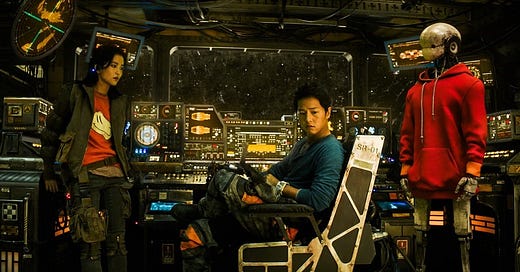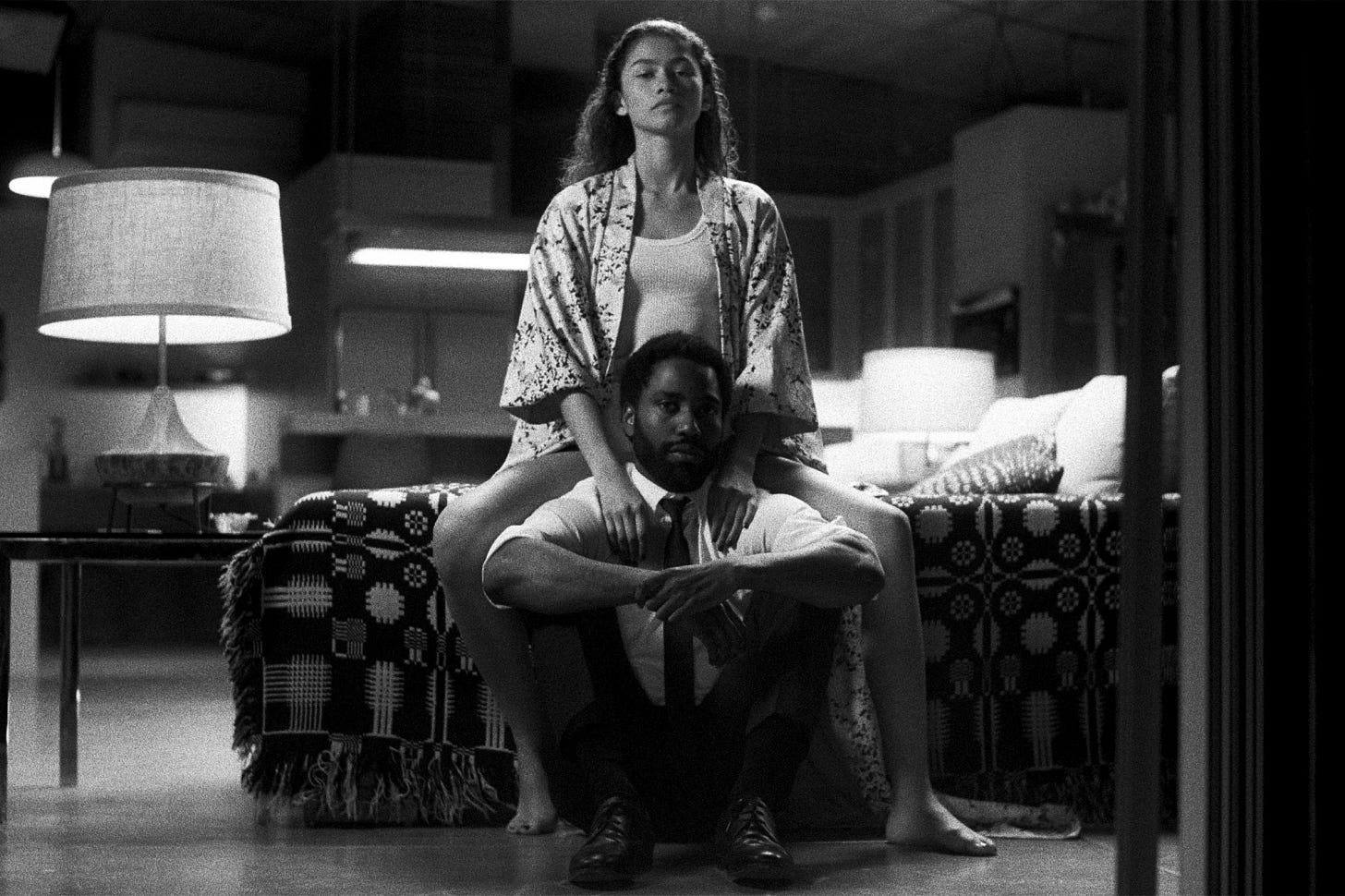We— like everyone— are indoors, eager to watch whatever is new and buzzy on our screens. Occasionally, our tastes converge and bring us both to recent entries into the Netflix canon—each a glimpse into a world turning inside-out. First, Zosha on the fantastical worldbuilding of Space Sweepers. Then, Cate on Malcolm & Marie and the insulation of discourse. Since they’re both on Netflix, we hope it’ll be easier than ever for you to check both of them…if you dare. On with the show.
Zosha on Space Sweepers
Like any good piece of fiction, science fiction can often live and die in the details. That’s just one of the things that makes Space Sweepers so damn fun to watch.
Set in a dystopian future where Earth has become near uninhabitable and plants won’t grow, we follow a ship full of “space sweepers,” tasked with the dangerous job of cleaning up the solar system from the debris of the terraformed edens in Earth’s orbit that only a select few can live on. The four misfits on the ship — a captain who drinks too much; a grieving father whose focus is money; the taciturn muscle; and a robot who dreams of a more affirming shell — find themselves saddled with some sort of dangerous humanoid (in the form of a young girl). After trying to spin a quick buck, they unearth explosive secrets and find a web of conspiracy.
Classic sci-fi stuff. It’s a mix of things you’ve seen before, no doubt; a bit of Titan A.E., a dash of (good from) Firefly, a heap of Battle Angel Alita (or Elysium, depending on where you encountered this idea). And yet, Space Sweepers feels fresh, largely because of its careful detailing on a tried-and-true formula.
Worldbuilding is a tool that can be so underutilized in science fiction, where glitz and possibility can give way to technobabble and need. If the story requires something to happen, and there’s already a talking robot, just let some little gadget fill in the blanks.
But Space Sweepers mines its world for everything, and in particular for character and story beats borne of details. Things that felt like they didn’t make sense (and, frankly, that I was inclined to brush away) wound up getting explained; elements not commented on feel intentionally thought through. The long and short of it is the world of Space Sweepers feels lived in. 2092 may seem a little close for such a world to exist, but it feels distant enough (especially after seeing how fast the world can change in just a few years) that it never feels out of the realm of feasible, even with the defense of “movie logic.”
One of the most remarkable elements that has stuck with me since watching the film is the translation, which allows a truly global approach to space. Each character is armed with a translator, and so everyone simply speaks in their native language. On a plot level it’s fun and engaging—Korean, French, English, German, and more are all bandied about in a scene without a problem. But on a filmmaking level it’s sort of astounding: each of these scenes was filmed with actors bouncing off each other for beats they logically knew but were not so much responding to in the moment (unless they’re more than just polyglots, but savants at languages).
It makes the fact that Space Sweepers’ story so affecting all the greater. We get a sense of the crew as a team who each really care—at first about their own demons, and ultimately about their shared mission. Sun-ni is perhaps a perfect precocious child character, balancing being adorable with being useful and also credibly compelling for the Victory crew to rally behind her.
Ultimately, Space Sweepers manages to be the rare kind of sci-fi blockbuster that fires on all cylinders: it’s well acted, well executed, makes a salient commentary without going too big or dire. The stakes are high, but when the foundation is this good it’s easy to sit back and enjoy the ride.
Cate on Malcolm & Marie
It took me a long time to get to Malcolm & Marie. By the time the film was released and available for viewing, the discourse around it had reached such a fever pitch that the mere thought of it exhausted me. It was easier to ignore the film outright than feel obligated to get sucked into discussions about authorship and power dynamics and the like. But as with everything Zendaya stars in (Circus Musical Hive stand up!), I eventually relented, and I have to say I’m glad I did.
Malcolm & Marie is a challenging film, but not necessarily in the way that might be considered a compliment. There are elements to the craftsmanship that are sincerely beguiling, and it is very interesting to look at. There’s a sleekness to every shot that teases at the depths the story ultimately aspires to. Zendaya herself is dynamic in the role of Marie and her performance alone is worth the price of admission. But taken together, the movie is nothing more than a frustrated filmmaker working out his neuroses through the talents of two black actors, and using their race as a cover for his own questionable perspectives.
The black-and-white chamber piece takes place in the hours after the couple returns home from Malcolm’s (John David Washington) film premiere. Malcolm is on a high as the film has been well received. Marie is more subdued—her mood a consequence of Malcolm forgetting to thank her in his speech. The film, after all, is based on Marie’s life. And as the rest of the story unfolds, we are subjected to the ongoing saga of the couple’s relationship problems—including but not limited to Malcolm’s privilege, Marie’s addiction, and Malcolm’s ongoing feud with “the white lady from the LA Times.”
My most visceral reaction to this film is to the tricky racial alchemy at play. Malcolm is a violently misogynistic man and partner. He directs his ire and cruelty to Marie throughout the film, berating and antagonizing her for the sin of having her own emotions. But he saves his most galling insults for the white female critic whose work he takes issue with.
John David Washington is… not a bad actor per se, but his performances are always overshadowed by the black hole of charisma he leaves in his wake. Malcolm & Marie is no different, but he tries his absolute best in a scene in which he eviscerates his unnamed nemesis to a giggling Marie. Chest heaving and arms flailing, he waxes on and on about the ineffectiveness of this critic’s writing, lamenting her decision to place his work within the wider context of existing black art. He rages and swears, denouncing her work and imagining vile fantasies. “Fuck you with a cactus dick!” he screams to an audience of one. It is as shocking as it is upsetting. Especially given that she’s written a rave review.
And here is where the Discourse™ intrudes. Allegedly, this beef is merely a reflection of the one director Sam Levinson has against freelance critic Katie Walsh. Walsh reviewed his last film Assassination Nation unfavourably, (a film I reviewed and praised) and Levinson has apparently never let it go.
Now, artists can and do make art about their lives. Some would say that’s the whole deal. But in Malcolm & Marie, Levinson—a white man, uses Malcolm—a black man, to advance questionable arguments about identity, belonging and race that he likely would not have felt emboldened to if his cast were white. Malcolm’s tirade against his unnamed critic feels violent and gendered. He is upset that she sees his work in the context of his blackness and accuses her of a racial blindness that affects the way his work is perceived.
But at no point does he step back to see that the reason her writing has such an influence on the reception of his work is because he lionizes her and the outlet she works for. Some of that can be attributed to the auspices of legacy media. I would be lying if I said I wasn’t still longing for a New York Times byline for example. But Malcolm is not a freelance writer. He is a well-regarded filmmaker with the power and means to shape his own narrative. And rather than take up that mantle, he whines that others have not shaped it to his liking.
It’s telling too that he’s so fixated on this white critic, when there is no universe in which she is the only one writing about his work. Critics of colour, black critics, black women critics are likely also engaging with the stories he is telling and raising some of the same critiques. But he is so wedded to the perceived prestige of the Times that he has rendered them and their dissent invisible by virtue of his neglect. He is not seeking out the people who he feels best represent the vision he was aiming for. Instead, he is harping on the ones who don’t—even when they compliment him in the process. And in doing so, he collapses the reactions of whole swaths of the audience, presuming both that they are homogenous, and that they are in his favour.
It’s a similar dilemma to the one presented by Kenya Barris’ BlackAF. In the show’s lone standout episode, Barris grapples with the idea that black artwork suffers because white tastemakers are too afraid to critique it. But he too forgets that white audiences are not the only ones engaging with his work. He is free to simply value the opinions of the people who are operating on the same wavelength as him.
And it’s the meta-narrative here that makes this turn so frustrating. Levinson puts these views in the mouth of a black man to guard against the critique of his own misogyny, cleverly deploying the twin oppressions of black men and white women, and putting them in direct conflict. But it’s Marie’s concession later in the film that reveals Malcolm’s true prejudices. She, a black woman, agrees with the white lady from the LA Times and would have surfaced similar objections had she been asked. But he didn’t ask. Because he doesn’t actually care to have a dialogue about the cultural context into which his work is being received. He merely wishes to be praised.
I have enjoyed most of Levinson’s work. He has found a muse in Zendaya and together they are making some of the best work of her career on Euphoria. But this film demonstrates that he is ignorant of his blind spots, and resents the implication that he should have to familiarize himself with them. In the end, he’s more like every other white man that he might care to admit. He is intent on imposing his will on the world.
Assorted Internet Detritus
ZOSHA: Behind creative convergence and the nine (9)! impending projects on the Gamestonks thing. The forecast for Summer 2021 is…partially sunny? Teachers unions aren’t the ones standing in the way of reopening schools. The acrobatic grace of Cary Grant’s comedy. The Buzzfeedification of mental health. It’s been a long road to making women superhero films happen.
CATE: Alternative movie endings lost to time and the internet memory hole, Carmela Soprano as trans root, a little concern for Billie Eilish, a little more for Billie Holiday, a minor sneaker scandal, a look at the curious rise of Woody Allen, an elegy for the Asian actors made invisible in their work and a remembrance of all the other women we destroyed along the way.
Zosha + Cate <3
TWITTER:@30FlirtyFilm
INSTAGRAM:@30FlirtyFilm










